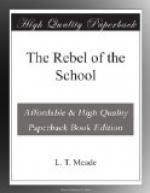“From what false motives it is impossible to say,” continued Miss Mackenzie, not taking the slightest notice of the little governor’s futile appeal, “you have decided to wreck your own life and to ruin the school. It was to have been your noble privilege to save the school in a time of extremity. You have chosen the unworthy course. It is therefore my painful duty to call upon Miss Ravenscroft as head-mistress to expel you, Ruth Craven, from this school. You are no longer a member of the Great Shirley School; you are—”
“Hold!” cried Kathleen.
Her voice rang out sharp and clear. It was heard all over the school, and was so imperative, so startling, so unexpected, that even Miss Mackenzie lost her self-control and fell back in silence.
“Hold!” cried Kathleen again. “You have said enough. I don’t think you ought to go on. You are torturing the noblest girl in the world. But Kathleen O’Hara, bad as she is, cannot endure this last insult. Girls—Wild Irish Girls, you who belong to my society—I as your queen desire you to come forward. Come forward in a body at once.”
What was there in the young voice that impelled? What was there in the young face that stimulated, that caused fear to slink out of sight and courage to come to the fore, that caused hearts to beat high with generous emotion? Not a single girl failed Kathleen in this moment of her appeal. They clambered over their seats; they bent under the forms; they got out in any fashion, until she was surrounded by the sixty girls who formed her society. She glanced round her; her dark-blue eyes grew full of sweetness, and there was a look on her face which made the girls for the moment feel that they would die for her.
“Come, girls,” said their queen—“come; there is room on the platform.”
She sprang up the couple of steps without another word, and the girls followed her.
“Do what you like with Ruth Craven, Miss Mackenzie,” she cried; “but put your questions over again to me, and I will answer them one after the other. Then expel me and my companions; turn us out of the school, but keep the girl who would be a credit to you.”
CHAPTER XXIX.
END OF THE GREAT REBELLION.
No one quite knew what happened next. Some of the girls went off into violent hysterics; others rushed out of the great hall, half-fainting; while others controlled themselves and listened as best they could. The scene was vivid and picturesque. Mrs. Naylor sobbed quite audibly, and took hold of Ruth’s hand, and even kissed it. But as she did so Kathleen herself came near and flung her arm round Ruth’s neck.
“If you mean to expel Ruth you will expel me,” she said. “But won’t you forgive her? If her ideas were wrong, they were at least generous; and you know that I won’t trouble you any more. I am very sorry, but I don’t think that I was made to suit a great school like this, and I give up the society—yes, absolutely—so you won’t have any rebels present in your midst again. Expel me, but keep her, for she will be the flower of your school, the greatest ornament, one you will talk of in the dim years of the future. Don’t let me feel that I have spoilt her life.”




